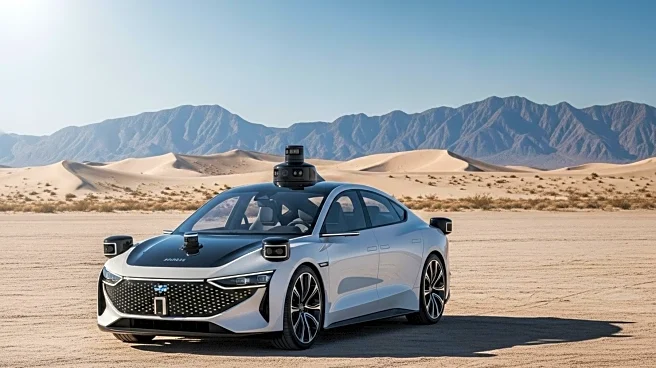What's Happening?
Tesla has received approval from Nevada state officials to test its advanced driver-assistance system as part of its autonomous vehicle program. This decision allows Tesla to conduct road tests of its Autopilot and Full Self-Driving technology across Nevada's roadways. The tests aim to evaluate the technology in real-world conditions, with a focus on safety and data collection to assess the feasibility of expanding autonomous vehicle services. This approval marks a significant step towards Tesla's goal of launching a robotaxi service, although further regulatory approvals will be necessary before any commercial operations can commence.
Why It's Important?
The approval for Tesla to test its self-driving technology in Nevada is a crucial development in the company's efforts to expand its autonomous vehicle capabilities. If successful, the robotaxi service could revolutionize transportation by reducing the need for human drivers and potentially lowering costs for consumers. This move also positions Tesla as a leader in the autonomous vehicle industry, which is expected to grow significantly in the coming years. The data collected from these tests will be vital in addressing safety concerns and regulatory challenges, which are critical for gaining public trust and acceptance of self-driving technology.
What's Next?
Tesla will proceed with conducting road tests in Nevada, focusing on gathering data to ensure the safety and reliability of its self-driving technology. The company will need to secure additional regulatory approvals before launching any commercial robotaxi service. Stakeholders, including regulators, industry experts, and the public, will closely monitor the outcomes of these tests. Successful implementation could lead to broader acceptance and integration of autonomous vehicles in other states, potentially influencing future transportation policies and infrastructure development.
Beyond the Headlines
The testing of Tesla's self-driving technology in Nevada could have broader implications for the legal and ethical aspects of autonomous vehicles. Issues such as liability in the event of accidents, data privacy, and the impact on employment in the transportation sector will need to be addressed. Additionally, the success of Tesla's robotaxi service could prompt other companies to accelerate their own autonomous vehicle initiatives, leading to increased competition and innovation in the industry.











